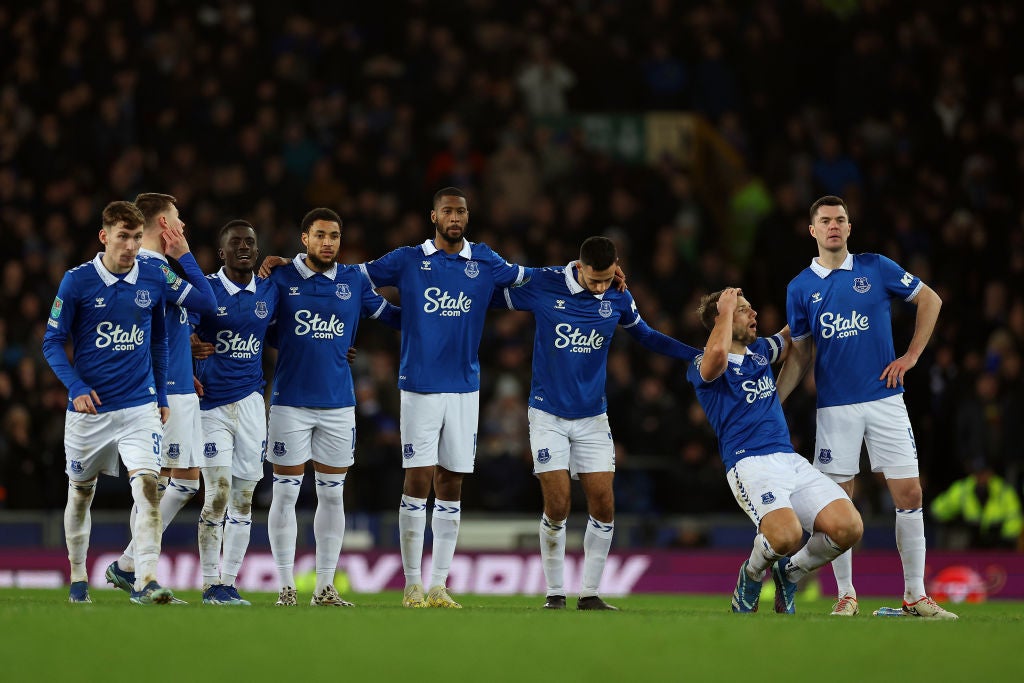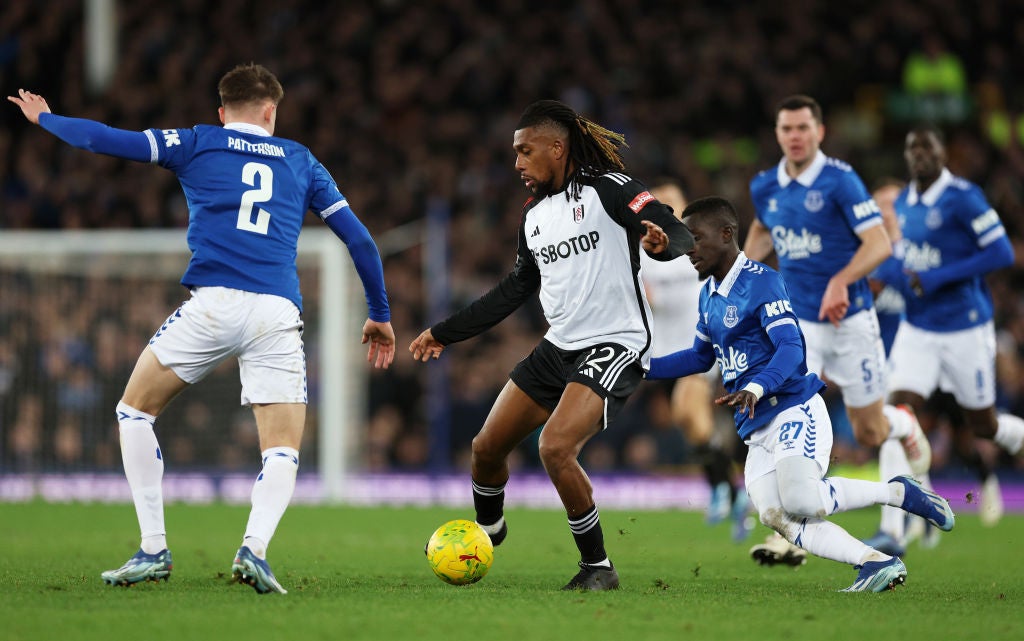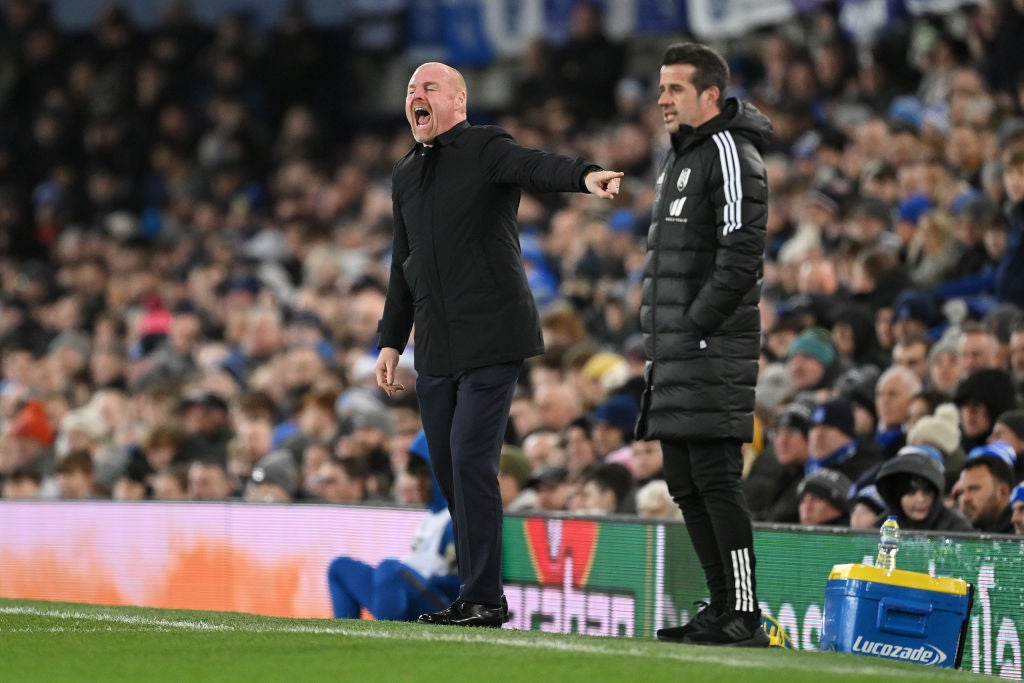Everton’s recurring reason for falling short in cups is fixable - this was another wasted chance
The Toffees went out on penalties to a Premier League side - but they were both at home and in-form

Your support helps us to tell the story
From reproductive rights to climate change to Big Tech, The Independent is on the ground when the story is developing. Whether it's investigating the financials of Elon Musk's pro-Trump PAC or producing our latest documentary, 'The A Word', which shines a light on the American women fighting for reproductive rights, we know how important it is to parse out the facts from the messaging.
At such a critical moment in US history, we need reporters on the ground. Your donation allows us to keep sending journalists to speak to both sides of the story.
The Independent is trusted by Americans across the entire political spectrum. And unlike many other quality news outlets, we choose not to lock Americans out of our reporting and analysis with paywalls. We believe quality journalism should be available to everyone, paid for by those who can afford it.
Your support makes all the difference.Steve Stone had his list. Everton had been practising penalties, just as they did before every round of the Carabao Cup and one of Sean Dyche’s trusted assistants, who was in charge of organising the shootout, had his list of takers. Go back more than a quarter of a century and Stone was in the Euro ‘96 squad whose chance of glory ended in a penalty shootout of their own.
In the Carabao Cup now, when Everton were shaping up as the Premier League’s form team, their plan for the shootout had worked. Jordan Pickford had made a save. Their first four takers had scored. Amadou Onana was up fifth, with a chance to win it. He produced a lame, tame penalty. Bernd Leno had the simple task of stopping it. And so, when Idrissa Gueye missed later on and Tosin Adarabioyo scored, Fulham instead advanced to the semi-finals.
Dyche contrived to offer neither an endorsement nor a criticism of Onana’s casual approach. “You do everything you can when the moment of truth comes and if you are brave enough to take one you have to be brave enough when it doesn’t go in,” he said. “Everyone has a style of penalty which they think can score. His record has been very strong in all the rounds and when we’ve practised them. That’s his style.”
His own style was rather different. Tongue in cheek, he said: “Having taken one myself in a big game, I don’t like to mention it – 50,000 in the stadium, a couple of million around the world watching – and sometimes you get lucky. I never took another one, by the way.” His goal for Chesterfield against Middlesbrough in the 1997 FA Cup semi-final came from the spot and entirely in the way most would imagine Dyche would take a penalty: a no-nonsense thump. Perhaps it was unsurprising it was how his long-term allies Michael Keane and James Tarkowski dispatched their own spot kicks against Fulham.
But Everton were eliminated in familiar fashion. There are reasons why big clubs like Aston Villa, Leeds and Everton have no silverware since the 1990s, while Newcastle’s drought extends more than two decades further. In the 21st century, the trophies have tended to be hogged by the superclubs and the rest can be left to rue their cases of what might have been.
And for Everton, in their 29th season since they secured a major honour, in their eighth since they reached a semi-final, there are recurring themes. Penalties rank among them. For the fourth time in six seasons, they went out in a shootout. Like Theo Walcott, Richarlison, Cenk Tosun, Leighton Baines and Tom Davies before them, Onana and Gueye proved the fall guys. There were similarities with the 2019 exit to Leicester: another quarter-final at Goodison against Premier League peers when a path to Wembley was opening up.

“Many people talk about luck, for me it is not at all,” said Marco Silva, the victorious Fulham manager; perhaps those were not his sentiments when his Everton exited on penalties to Southampton in 2018. In the years since Everton’s 1995 FA Cup win, they have had some embarrassing League Cup defeats: to Oxford and Bristol Rovers and Brentford. But there have been too many that were losses in this sort of tie: to another Premier League side.
And the contrast with their recent FA Cup record shows why such games assume more importance. In the last eight seasons, Everton have gone out to either Liverpool or the Manchester clubs five times. Such ties are not unwinnable, but they do come with an inherent disadvantage.
David Moyes’ worst FA Cup defeat as Everton manager was to Shrewsbury in the season the Shropshire club was relegated from the Football League. Yet the most galling may have been the 2013 quarter-final loss to Wigan: because, with many of the favourites already out, Roberto Martinez’s side went on to draw Millwall in the semi-final and win the trophy. Now Martinez remains the last Everton manager to reach a semi-final.
Meanwhile, Dyche’s reputation has been forged in league football; perhaps fittingly, given his pragmatic air.

He has left the romance of the cups for others. He has never reached a semi-final as a manager; his last as a player was third-division Chesterfield’s unexpected foray deep into the FA Cup.
He never seemed to disappointed to be knocked out with Burnley. Nor was he distraught by Everton’s elimination although he often endeavours to remain on an even keel. He accepted penalties are not a lottery. It was why Everton had done so much work on the training ground. But while there are other factors to explain why no one has needed to open the trophy cabinet at Goodison since the 20th century, problems with penalties are becoming a regular, and costly, flaw.
Join our commenting forum
Join thought-provoking conversations, follow other Independent readers and see their replies
Comments